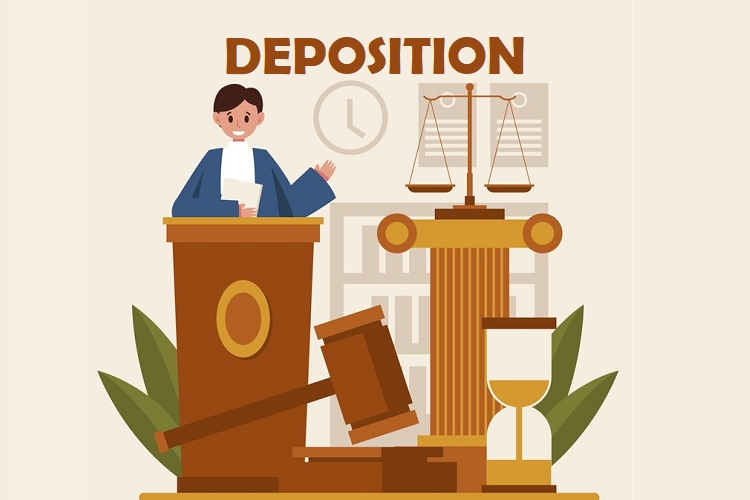Are you struggling with the term depositions in legal matters? Like what is it and how does it work? Many people do so. So, what is a deposition?
A deposition is an interview where the deponent takes an oath and shares their side of the story. It happens outside the court in front of a court reporter. The reporter records it.
So, the working process of depositions follows a step-by-step process. It includes taking the oath, the questioning process, and many more.
Want to know more about depositions? Then this blog is for you. Here, I will share the definition working process, what happens after deposition, and many more. So, let’s begin the discussion with the definition of deposition.

What is a Deposition?
A deposition is a formal interview, but it does not happen in court. It happens when someone, like the deponent, talks about what they know under oath. You will share your side of the story in deposition, but not in the usual courtroom setting. A court reporter records this testimony.
During a deposition, you will find many parties are involved. Here the parties are:
- The deponent
- The party bringing forward the claim or lawsuit
- Attorneys representing the parties (although they may not need to be present for written depositions)
- A court reporter
- Other attendees. (It may include paralegals, investigators, and expert witnesses. Mostly depends on the case.)
Typically, most of the deposition happens in a lawyer’s office or a conference room. Again not in the courtroom. They are in the discovery phase, where parties share info. Although not usually evidence, depositions can be if a witness changes their story.
In a deposition, you and the opposition both can ask any type of deponent questions. Here, people must speak the truth as they have taken oath. Lawyers make sure everyone knows this. Sometimes, a subpoena forces someone to attend. Finally, Depositions help lawyers prepare for trial by figuring out what happened.
How Does a Deposition Work?
After knowing what deposition is, you must know about its working process. It makes the deposition concept more clear for you. So, deposition follows a pattern. So, let’s learn about the working process of deposition.
Location and Participants
Depositions don’t happen in courtrooms. They usually take place in lawyers’ offices or conference rooms. And guess what? No judge is there during a deposition. Instead, a court reporter records everything said.
Taking the Oath
Before the questioning starts, the witness, or deponent, is sworn in. They promise to tell the truth. Remember, you may face some consequences if you lie under oath. It is known as perjury.
Questioning Process
The attorney who arranged the deposition asks the initial questions about the lawsuit. Other lawyers present can also ask questions. The deponent’s attorney may object to some questions, but usually, the deponent must answer.
Duration and Limits
Depositions can go on for a while, usually around 2 to 4 hours. There are rules from the state or federal court that say how long they can last. In federal cases, it is usually capped at 7 hours. However, some shorter depositions can be as brief as 30 minutes.
Attorney’s Role
The deponent usually has their attorney present, but their role is limited compared to in court. They may object to questions but will likely only intervene if necessary.
Questioning Scope
During a deposition, they ask lots of questions about the lawsuit. But the questions have to be about important stuff. If a question seems wrong, the lawyers can say they don’t like it.
Recording and Transcription
A court reporter records the entire deposition word for word. The transcript is then provided to both parties for review. The deponent can ensure its accuracy before signing it.
Use of Transcription
The transcript can be used as evidence in court or to support motions filed in the case. Both parties have access to it for their use during the legal proceedings.
What Types of Cases Require a Deposition?
Depositions are super important in legal cases. They help find out what happened. Like in a car accident downtown, they talk to drivers, passengers, and witnesses to see who is at fault and how bad the injuries are. And when contracts are broken, depositions help figure out what went wrong.
They allow lawyers to dig into the details, gather testimonies, and understand the case better from different perspectives.
Expert opinions also play a big role. For instance, if there’s a workplace accident and safety reports are important, experts might need to explain their findings. And in cases where a professional like a doctor or engineer messes up, expert depositions are necessary to understand what happened.
There are different ways to do depositions, each with its pros and cons. Written question depositions, though not as common, can be useful when witnesses can’t attend or if you’re trying to save money. But they take longer because you have to wait for answers.
Then there are traditional in-person depositions. They are popular because they help lawyers meet witnesses in person to see if they’re telling the truth.
Remote depositions are another way for this. They are cheaper and easier, allowing people to join from different locations without losing the serious courtroom atmosphere.
Hybrid depositions mix both in-person and remote methods. You can easily handle them when you have the flexibility of it.
First, you must decide the type of deposition. Many things depend on that. Such as what is the type of the case, what parties involved there, and how much money you have for the case. Remember lawyers need all the important information for a strong case.
What Happens After a Deposition?
After a deposition, there’s still more to do before everything is completed. Here’s what happens next:
Digging Deeper
Depositions often uncover new info, so both sides might need to do more investigating. This keeps the discovery phase going, and they might schedule more depositions if needed.
Getting it on Paper
The court reporter makes a written transcript of the deposition. This document is crucial because it lets everyone see what was said and compare it with other evidence.
The transcript helps parties understand the case better. It also helps them plan their next steps, like settling or going to trial.
Negotiating for a Deal
In a personal injury case, both sides usually sit down to negotiate a settlement after the deposition. The testimony from the deposition helps show if the party being sued messed up and caused harm.
Your lawyers will go over the deposition with you to see how strong your case is. If things went well in the deposition, your lawyers have more bargaining power to get you a good deal.
Making it Official
When both sides agree on a settlement, they sign a settlement agreement. This means the other party has to pay for the harm you suffered in the accident. It is a done deal. But if they don’t offer enough, you might have to get ready for a trial.
Talking it Out with a Mediator
If talks don’t work, the parties might try mediation. This is when a neutral third party helps them figure things out without going to court. It is not always necessary, but it can be a good way to find common ground.
Taking a Second Look
After the deposition, everyone involved gets a chance to review the transcript. This helps catch any mistakes or things that need to be added up. In Rhode Island, there’s a set process for this, giving everyone time to check things over and make any needed changes.
Settlement Timeline
How long it takes to settle after a deposition can vary. It depends on stuff like how complicated the case is and if there’s any new evidence. Sometimes things take longer than expected, but both sides have to play fair during negotiations.
Between the deposition and settling, it’s important to stay in touch with your lawyers and keep quiet about the case details. Once a deal’s reached, your lawyer will handle getting you the money owed after taking out their fees and costs.
12 Tips for Deposition Preparation
Preparing for a deposition is a big deal in your legal case. It’s a moment where what you say can really make a difference. Here, I’ve got 12 solid tips to help you get ready:
- Talk to Your Lawyer: First, you must talk to your lawyer. Go through the case together and acknowledge the facts. You must ensure that you understand every fact properly. It helps you to answer the questions perfectly during deposition. Discuss all the good and bad parts of your case with your lawyer.
- Listen Carefully and Think Before You Talk: When a lawyer asks you a question, don’t answer immediately. First, listen to the question carefully. Then take some time to think. Then answer the questions. It helps you to avoid saying too much. This gives your lawyers a chance to step in if needed.
- Keep It Simple: Stick to answering just what’s asked. There’s no need to offer extra info unless they specifically ask for it. Giving too much can just open up more questions you might not want to answer.
- Get clear: If you do not know or are sure about an answer to a question, then don’t hesitate. Speak up and ask for clarification. It is far better than to give a wrong answer. So be sure first.
- Be honest: Always tell the truth during depositions. Even if doesn’t work in your favor, still don’t lie. Tell the truth as honestly is always the way to go. Remember, if you lie there is a high chance of getting caught. It can be an issue for your case for the next step.
- Stay Calm: Some questions during depositions can be nerve-wracking. So, keep yourself calm as much as you can. If you start shouting during depositions it creates a negative impression on the other side.
- No Guessing: You don’t have to answer the questions that you don’t know. Don’t try to guess during the depositions. It is normal to say no. Remember, guesses can sometimes create huge problems.
- Admit When You Don’t Remember: If you can’t remember something, just say so. Making up answers on the spot can cause problems. Being honest is the best policy.
- Stick to Your Story: Once you’ve said something, stick to it. Changing your answers can look pretty sketchy.
- Check Out Any Documents Carefully: If they show you papers or pics, take your time looking them over before saying anything. You want to make sure you know what’s up before you talk about it.
- Keep Silence when you are done talking: After you have spoken, it’s fine to stay quiet instead of feeling like you have to keep talking. Just chill out until the next question comes.
- Leave the Papers at Home: Don’t bring any notes or papers with you. Bringing them along could lead to more questions and might mess things up.
Conclusion
In wrapping up, depositions are important in legal matters. They ensure the truth comes to light and aid in trial readiness. Following my shared tips here, make depositions easier for you. You can easily prepare yourself for depositions.
Suppose, you are planning to do a settlement or heading to court, you must be ready for depositions. It makes a huge difference. So, that is why, knowing about depositions and taking preparation for it is very important for you in legal matters.
FAQs
What Happens Before a Deposition?
Before a deposition, everyone involved gets ready. Lawyers and clients go through documents and understand what the case is about. They talk about how the deposition works and why it’s important to be truthful and answer questions well.
Sometimes they practice in pretend sessions to get ready. They might also ask the court to change things if needed. The goal is to be totally prepared to give good, honest answers during the deposition.
What Happens After a Deposition?
After the deposition, review the transcript for accuracy. If you find any mistakes or incomplete answers, deal with them promptly. Stay connected with your legal team to plan your next moves effectively.
Keep your legal goals in mind and concentrate on reaching them. This will help you prepare for what comes next and improve your chances of success.
How Long Does a Deposition Take?
Depositions can range from 2 to 3 hours for parties and around 30 minutes to an hour for witnesses. In complex cases, they may last 4-6 hours or more.
They occur in attorneys’ offices, not courtrooms. So, typically, expect anywhere from half an hour to two and a half hours for a standard case, possibly longer for more complex ones.
Can You Refuse a Deposition?
Refusing a deposition could land you in trouble, even forcing you to attend. The subpoena mandates your testimony on a specific matter; failing to comply could mean fines or other consequences.
In some cases, protective orders might halt depositions for your well-being. But always chat with your lawyer before refusing.



